In this briefing we covered the limited preview crowdfunding we just launched on the Castle investing platform. Do you want to know how it could work for YOU? Water On Demand is paired with the totally advanced Modular Water technology and we were treated to a brilliant presentation by Dan Early and his technical team of a real-life installation, complete with video and 3D CAD drawings... We think it is all leading to a new and much better day for water… And on World Water Day we'll be bringing it to you and the rest of the world LIVE from New York! Get all the details here in the replay!
Transcript from recording
Opening
Estrella: You can be a part of the clean water revolution. The government is failing to take care of our water with outdated infrastructure, lack of funding and just plain neglect. We are going to revolutionize this trillion dollar industry with incredible technology, innovative financing and expertise that will help water users clean, recycle and transform the state of water. All powered by incredible investors who can participate in the potential benefits.
I am so thrilled to announce that OriginClear's Water On Demand™ initiative is now open to investors. Who wouldn't want to help us change the world while creating a potential revenue stream that will last for generations. With your help, we are solving the problem that stagnated the water industry for decades — Capital. We are the water fintech of the future and we're here right now. Join the Clean Water revolution. Find out more at Water On Demand dot net.
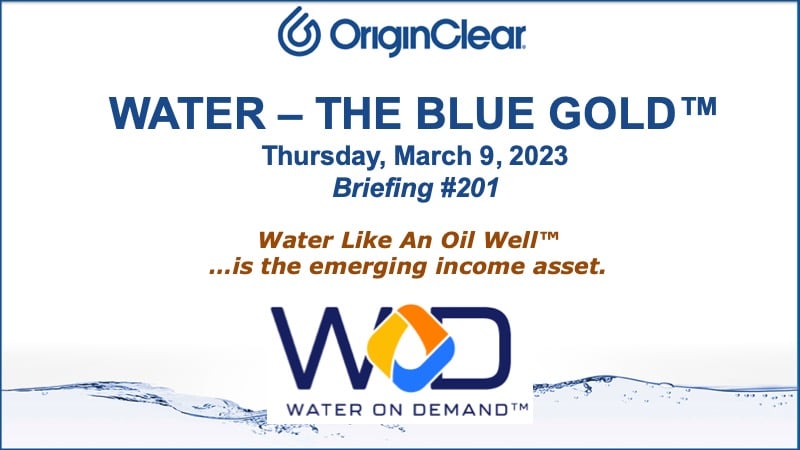
Introduction
Riggs: Oh yeah. That was a good opening by the incomparable Estrella Nouri, who was actually with us tonight and will join us later, because the one industry I've noticed is all guys and we have to change that. It's enough, enough, you know, diversity. So welcome, everyone. I'm seeing that people are showing up. I think it's going to be a great show. Robert Baxter, "We have arrived." All right.
It is Thursday, March 9th, 2023. Briefing number 201 Water Like an Oil Well™, the emerging income asset.
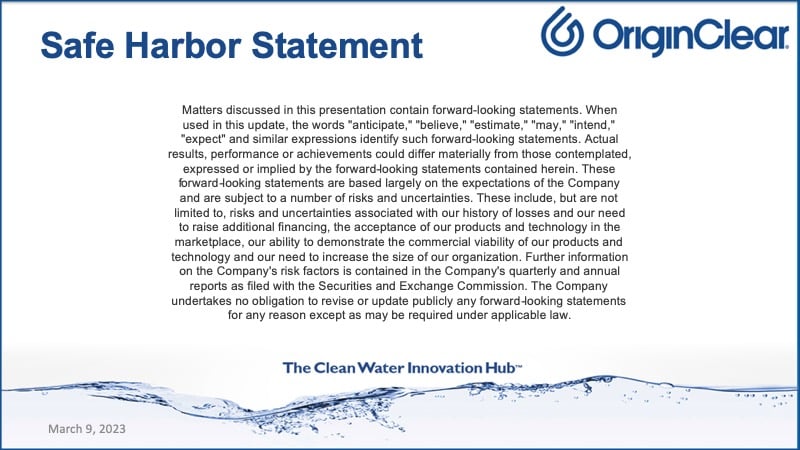
As usual, we have our disclosures.
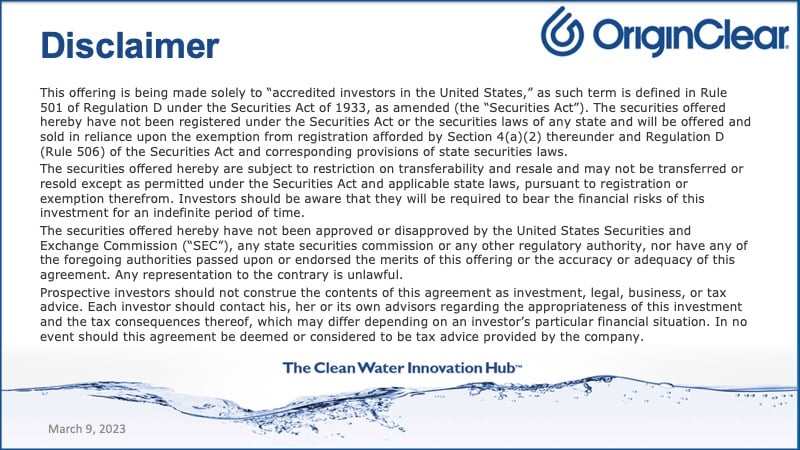
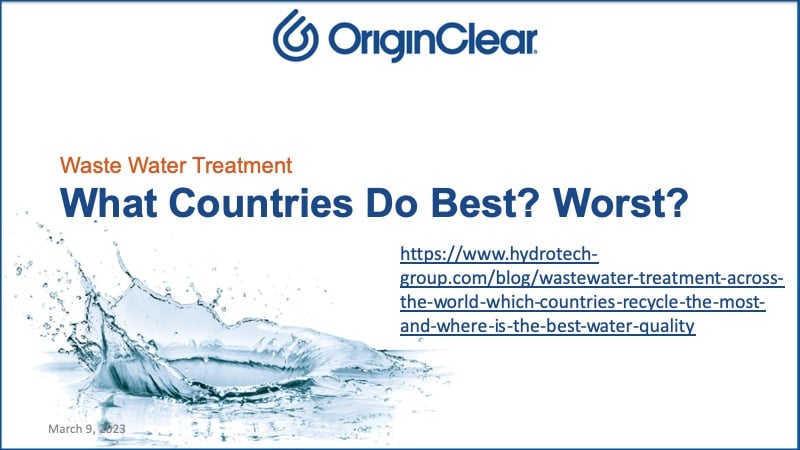
I ran into this story. This is really interesting. In wastewater treatment. Who does best? Who does the worst?
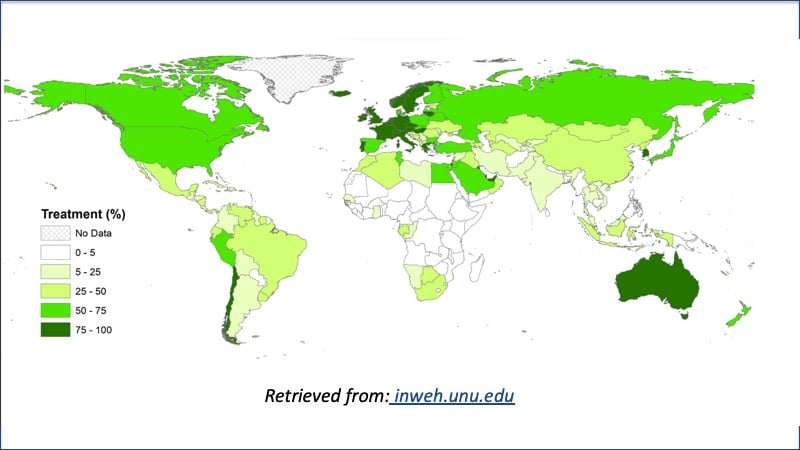
Let's take a look at the map, first of all, in terms of percentages of treatment. Big problem in Africa. I've cited Bangladesh before, and sure enough, they show as white. So the US, interestingly enough, is not as strong as Europe and Australia, South Korea and some of the Gulf states as well as Israel. So the dark green. And then we have Chile, which looks good. But it's interesting that we're kind of at the same level as Egypt, Saudi Arabia, Russia, Finland. It's kind of interesting datum.
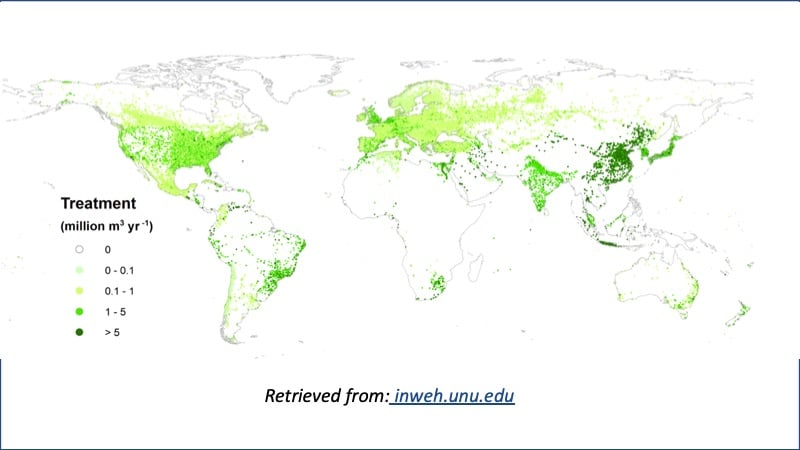
Now, here's what's the next part of it. How much is treated. Notice how much density of treatment China has. That's greater than 5,000,000m³ per year. Each one of those dots, each one of those dots. So it tells you kind of like where all the water treatment is happening. America's got a ton going on. I would say that we have good density. Brazil down by Rio de Janeiro and then Europe is more, is more dispersed, looks like. Anyway, I thought that was very interesting.
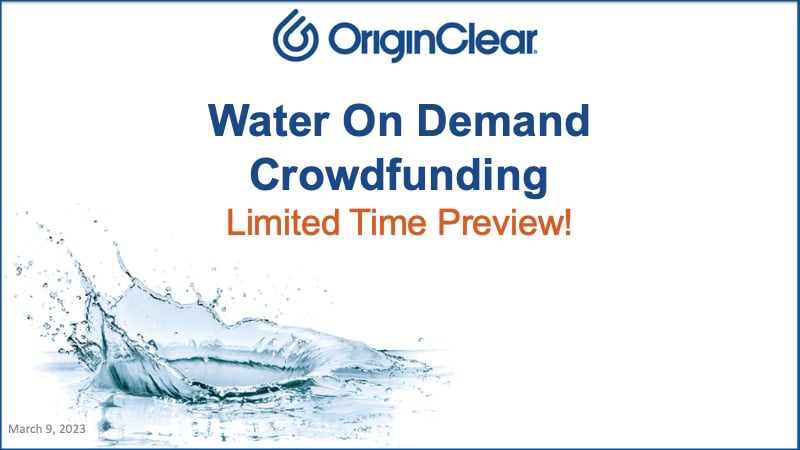
Well, I'm happy to announce that we have launched the Water On Demand crowdfunding and it's a limited time preview. What's up with that? Well, here's the release.
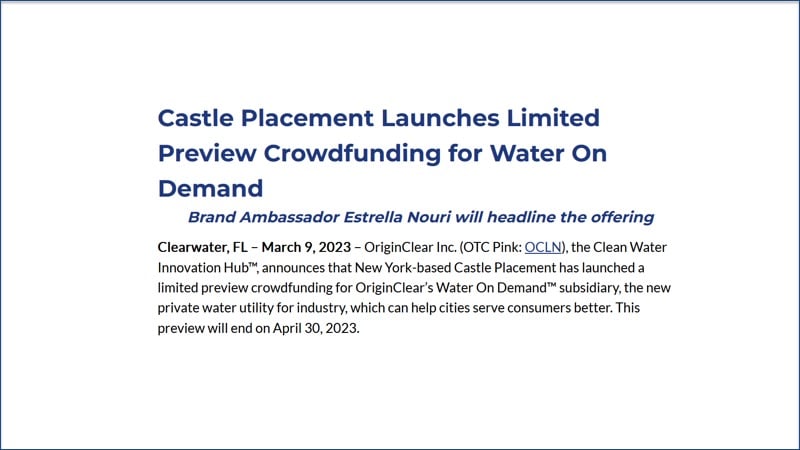
Basically, the New York based Castle placement broker dealer platform is hosting our Regulation A offering and the Water On Demand subsidiary, the new private water utility for industry, which can help cities, can serve consumers better. Notice how we're starting to tweak the language a little bit, getting away from Water Like an Oil Well. And the reason is that the crowdfunding investors, because they're small, we're not going to be paying dividends. Rather, they will be common shareholders and they will of course benefit from the company doing well.
Now the preview will end on April 30th, so we have less than two months for this preview. Now, why is this? Well, actually, I can't say, but we have things happening to Water On Demand which are going to cause us to have to pause the crowdfunding offering. It's planned. It's a planned interruption, shall we say, and it will restart. But as to when it will restart, I don't know. So people who want to get in should get in now. And Skye Logan says, "Absolutely fantastic." Yeah, baby.
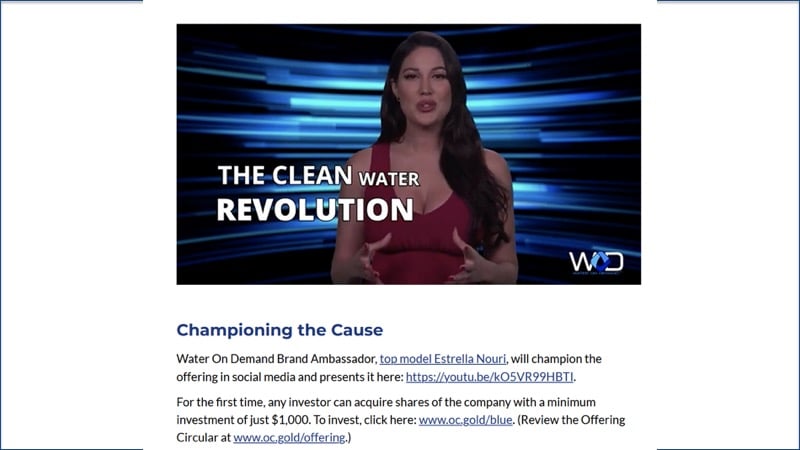
And here is, of course, Estrella, who is championing the offering. And the minimum investment is $1,000. You can reinvest as many times as you want a minimum of $1,000 to a maximum of 10% of your annual income. Well, if you're accredited, of course, there's no limit. All right.
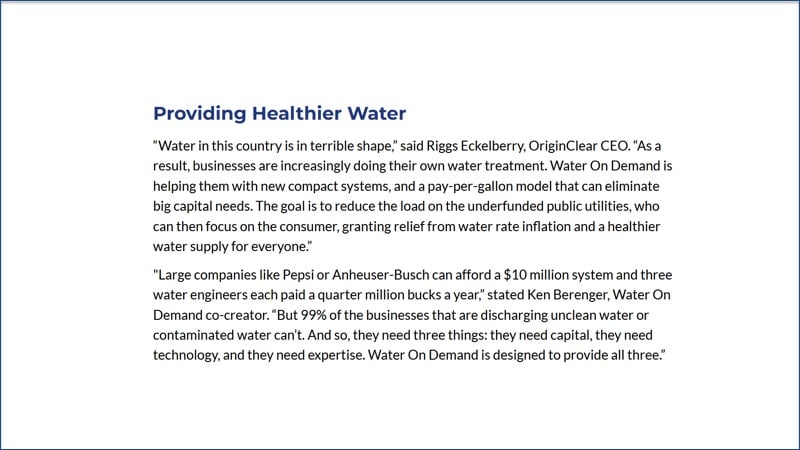
So, again, you know how we're providing these compact systems, reducing big capital needs, whereas big companies can handle the expensive systems. This is towards the bulk of the businesses that might not have the capital nor the technology, of course.
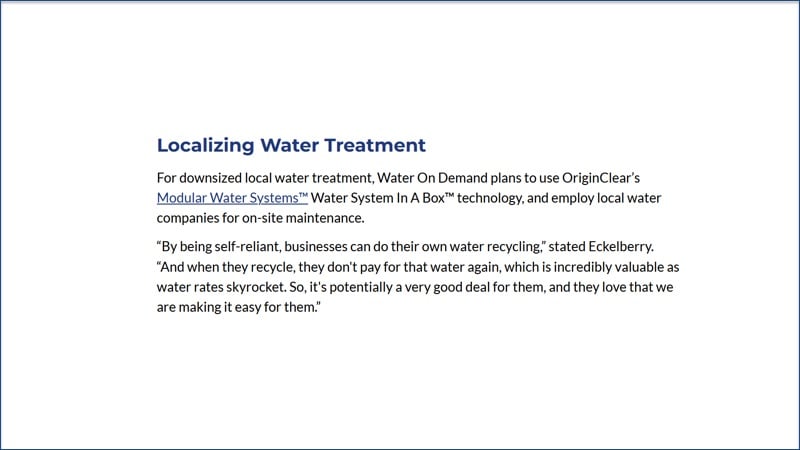
All right. Modular Water Systems Of course, we'll be relying on that. You're going to be hearing a lot more about that.
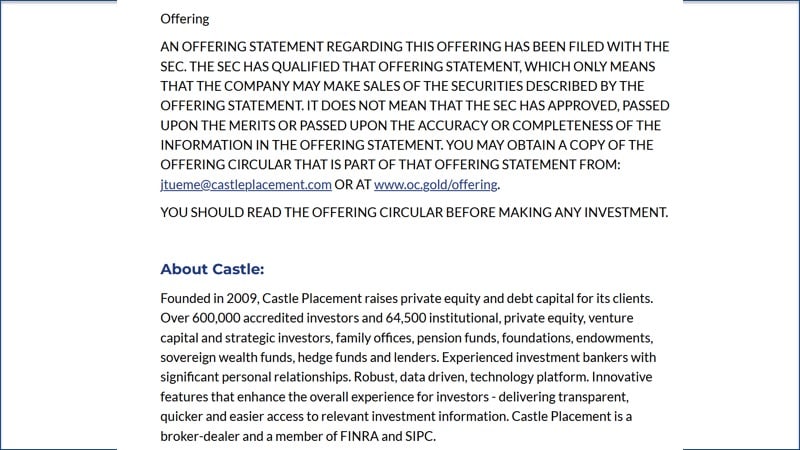
And here is the disclaimer. And Castle placement is a strong player that has a lot of investors and has raised a ton of money. Let's go take a look at oc.gold/blue, which is the Water On Demand Castle placement site.
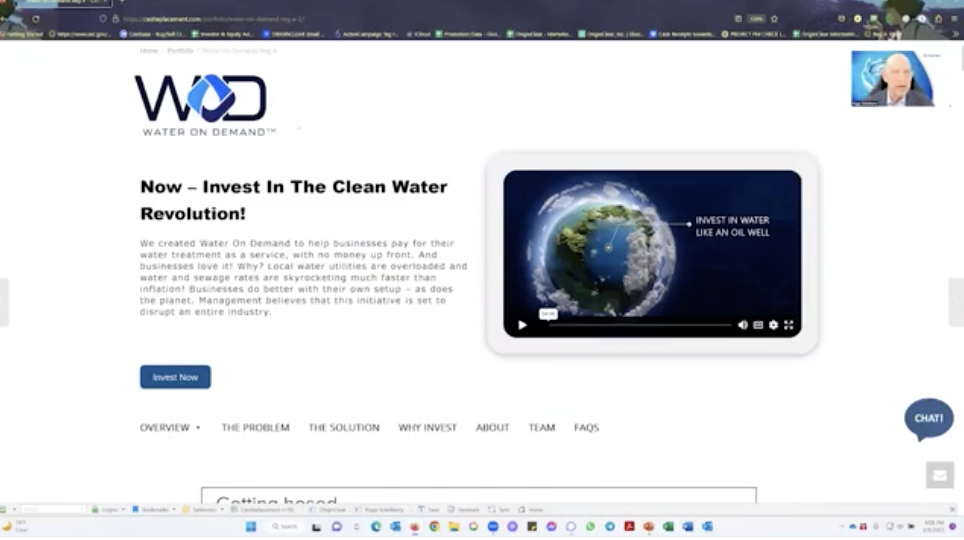
And it's a simple one. And basically it walks through the big problem with terrible inflation, how we're expanding things, instant infrastructure, the problems with tap water. And who is dirtying the water? How it could be an investment of a lifetime. Change the world. And OriginClear being the Clean Water Innovation hub. Here is the team. And here's the offering summary. And then we have the FAQs. Okay. So with that, that's a quick look at the site. Charles Walker, "Was that a little foreshadowing, the pause that will have to be taken?" Stay tuned, as Ken put it just now. All right.
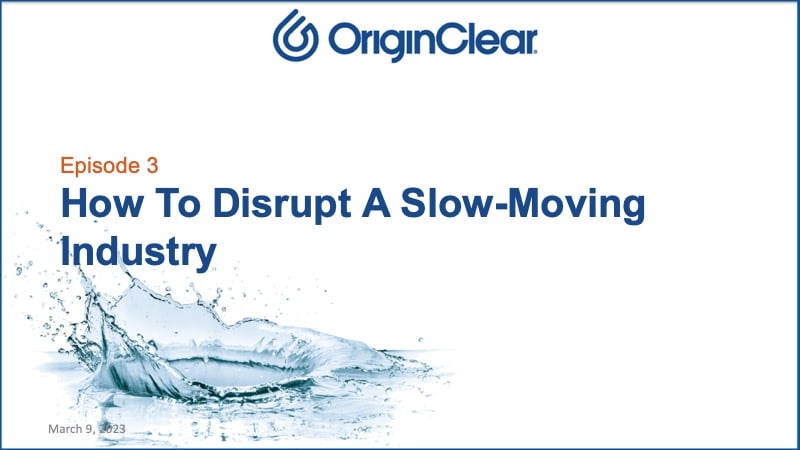
So how to disrupt a slow moving industry? This is part three of this interview. Let's do a quick listen.
Start of presentation
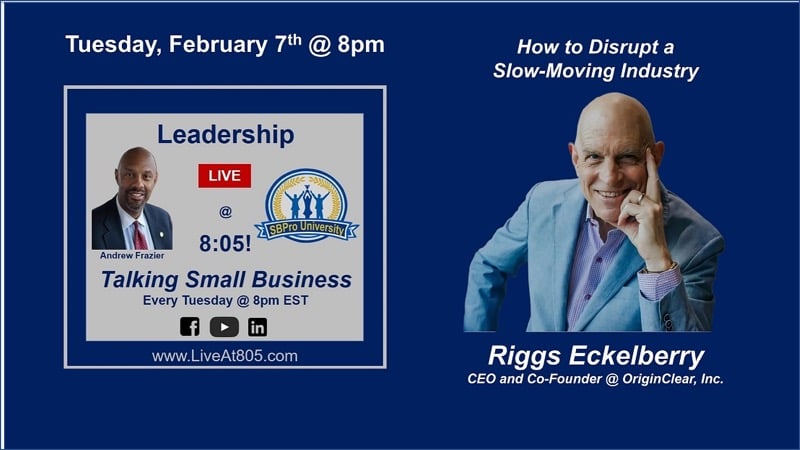
Andrew: You've done a whole bunch of things and you've learned a whole lot. What have been the most valuable skills to your success?
Riggs: Number one is scared rabbit. Move like a scared rabbit. In other words, don't, complacency is your enemy, right? Just move, move, move, move, move. But with that goes the need to figure out what you're doing that's unproductive, right? Because you can run around like crazy and run around and not get anywhere, right? So that's the two problems. Being complacent. Okay, start moving fast. And when you're moving fast, get rid of the things that aren't working.
And one of the biggest things of all, in my opinion, is how do you handle scaling up your business? This is something I've been really looking at more and more because, for example, when we designed this Water On Demand thing, which is a way to finance businesses doing their own systems, we had to decide, Hey, wait a minute, we're going to finance all these businesses. Does that mean we're going to install water systems everywhere?
We've got somebody in Seattle. Now we're going to go to Seattle and build a system? Well, then I got to buy a water company and then, I don't know, we decided to give up that revenue and give the job to a local Seattle water company that would be completely blown away they were getting the business and they would take care of the operation and maintenance and we would manage the customer relationship and the finance.
There's more money in being GM Financial than in being GM. So we made the conscious decision to not keep it. We have a good operation in Dallas. Excellent, but growing it is really hard because of the problems of growing a manufacturing business. So instead we said, You know what, we're going to be the fintech for Aquatech.
We'll be the financial tech network enabling these pay as you go systems and then use local partners to build them and maintain them using our technology to standardize the fleet. Well, that's been a very important decision because I don't have to put into my forecast the need to buy or build 50 water companies, which would take me another 30 years.
Andrew: No, definitely. I think that fits with do a lot of coaching and consulting and actually both of those things fit with one of the some of the first things that I do to assess where things are with the client. So one of the first things I ask them is what is your most important job as a business owner? Because if you don't know that, how are you going to prioritize and do the right things? And many times they don't know or they didn't go into business for that. So they don't think about their job really being marketing and selling. You know.
Riggs: You never stop selling. Oh, my God. So but a big piece of sales is caring, right? That it's. Yes, it's hard to acquire a customer. But now think about really caring for the customer and keeping them because that's that was my 80s lesson, right? The long term, the long tail of a business relationship. And that is where most of the money is lost, in my opinion.
Andrew: Okay, cool, cool. And then so definitely productivity is key. And then the second point you made, let me see.
Riggs: Accuracy, right? Eliminating the things that don't work be brutal about that brutal triage in a way, right?
Andrew: So, yeah, so, you know, you're doing you're doing trial and error, but hopefully, you know, in a smart way and guided by, you know, as much research and analysis as you can do.
Riggs: Well, Andrew, I was fascinated to learn a few years ago the difference between battlefield triage and hospital triage. Hospital triage is about who's the worst off that we got to take care of right now and the rest if they're sitting in the hallway and they're okay, then just leave them for a bit. Right. Battlefield triage is who can we take care of that can go fight again right now. Right. And the worst hurt are the least priority. It flips it around. Right?
Well, as a business, you've got to use battlefield triage. You've got to be brutal with, okay, what is the resource that's going to do me the most good? This other resource that is really in trouble but is going to be like a black hole for me. I'm just going to put it aside for now. Thank you very much. Let me first take care of business And that kind of brutality I think is needed in a small business owner. Totally.
Andrew: Yeah. And one of the reasons it's tough is because you got to make tough decisions. Sometimes, you know the decision you need to make, but you may not want to make. You know, I talk to clients all the time. One recently, you know, he had hired somebody, but then. They kept wanting to push the date back when they started. And then someone else they interviewed came along that they liked better. So I was like, Well, you know what you need to do? And, you know, it's a hard decision, but, you know, at the end of the day, you got to make the decision that's best for your business. And, you know, so a lot of people would have a lot of trouble making that.
Riggs: Yeah. And also, you know, don't be afraid to like, okay, you know that wasn't a great decision. Move on, move on. Just go, go, go. Right. Because at the end of the day, your momentum is everything. I you know, I love having this living, breathing organization that is totally reliant on how I set the tone. You know, you can always tell if you're talking to a customer service person what the attitude of management is by how the the front people are behaving. And if the front people are taking lots of care and really paying attention, you know that management is that way. And the opposite is true too, right?
Andrew: Yeah. Yeah. So yeah. And you know, that's really the culture. And you know, as the CEO or owner, you got to own the culture and do everything you can to make it a high performing culture. You know, we didn't really go into culture and we're running low on time because an hour goes really fast. You know, we've talked about a lot of cool stuff and but, you know, what do you want to leave people with? What should they be thinking about tonight and tomorrow that they can, you know, put to work to help them be even more successful going forward?
Riggs: Well, Andrew, the first thing I would say is speed of adaptation. Adapt rapidly, constantly figure out what works, throw away the old. That's number one. Number two is think about the long term value of each customer you get. How can I? The cost of acquisition is relatively high. Don't waste it. Really, you know, monetize it. So what can I do to continuously monetize that customer through great care, through additional products, additional services, you name it. Right.
And the third thing is grow people around you who have the same culture as you, who think like you and who are going to propel that, as you say, the culture forward, that you don't have to constantly go, you need to take care of that person. No, they get it already and those people are out there. They're worth getting. So those are the three.
Andrew: No, those those are excellent speed keeping, moving forward and momentum. Relationships. So long term value comes from your relationship. But also, you know, you've given thought to how you can maximize the revenue you're getting from different, from each client, which is key. And, you know, having recurring revenue is very valuable. And then, you know, creating the culture, you know, that's the only thing that's going to allow you to create a business that can run without you and to create a valuable business that someone would be willing to buy.
So, you know, great things to leave us with, great having a chance to hang out with you and chat about business. My favorite topic and of course, you know, I can tell that you like it a lot too, which is great. And, you know, always love to share things that could help other entrepreneurs and businesses.
Riggs: Andrew, it's been such a pleasure talking with you. I love the comment comment threads. Dr. Michelle Scott, thank you so much for your kind words. It's been really a wonderful experience and I really appreciate the opportunity.
End of presentation
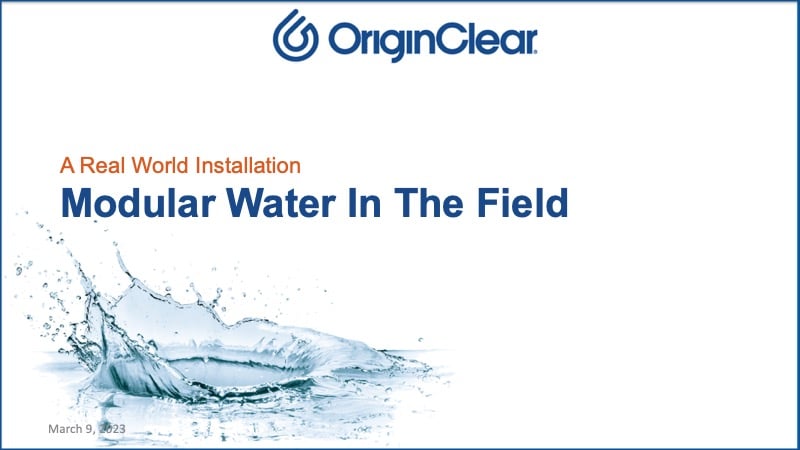
Riggs: Now here's a super, Oh, you're going to love, love, love this video. Oh, this is a first. This is not Riggs Eckelberry talking about wonderful management stuff. This is the real thing. Dig it. You'll see exactly what I'm talking about.
Start of presentation

Hi, I'm Riggs Eckelberry and it is the 24th of February 2023. I'm happy to bring together a team from my company, OriginClear, and various divisions. We're going to tell you about an installation that was done for a Modular Water Systems™ client. And with me is Dan Early, who's the chief engineer of OriginClear and the head of the Modular Water Systems division, also Mark Mazochette, who is senior engineer and engineering manager for Modular Water Systems.
Colin Sherman is the brand new operations manager for a new company we've got called Water On Demand, which does pre funded systems that clients can pay for by the gallon. It's basically water as a service. Very exciting. So with that, I'm going to get right into it. Dan, tell us about this project and how it came about.
Dan Early: It's a decentralized wastewater solution and an equipment package that we delivered to a mobile home park customer in Pennsylvania. Customers that we've been working with this customer for about 18 months now. They were under a notice of violation as implemented by the Pennsylvania Department of Environmental Protection. Their old onsite wastewater system was out of compliance with their discharge permit. And so the state of Pennsylvania said cease and desist or fix your problem.
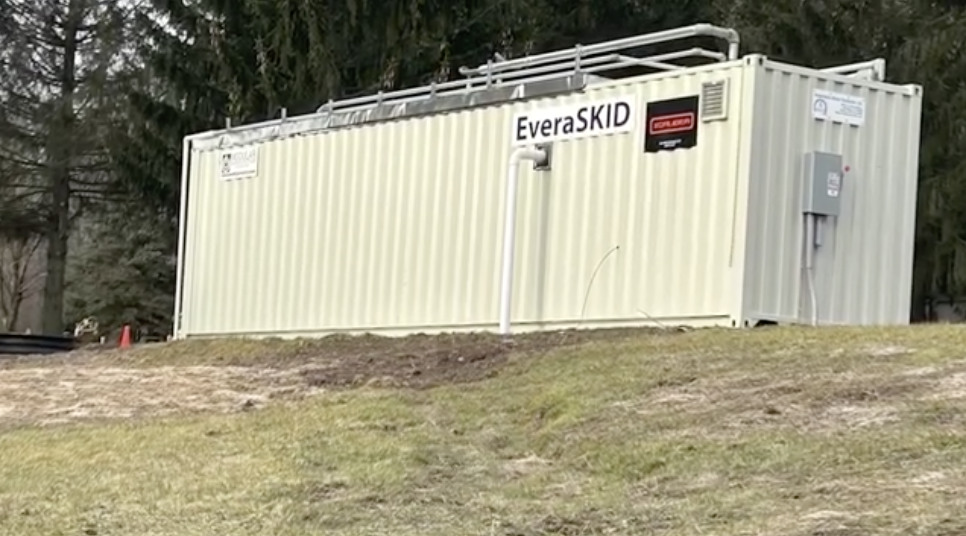
So they approached us a few years, a few months ago, and we proposed our plug and play EveraSKID™ Membrane BioReactor technology, their consulting engineer that was representing them, they were pleased with what they saw. They liked the concept. They liked the ease of installation and the simplicity of the operation of the system. And so we were selected as bases of design. We entered into a design build contract with them.
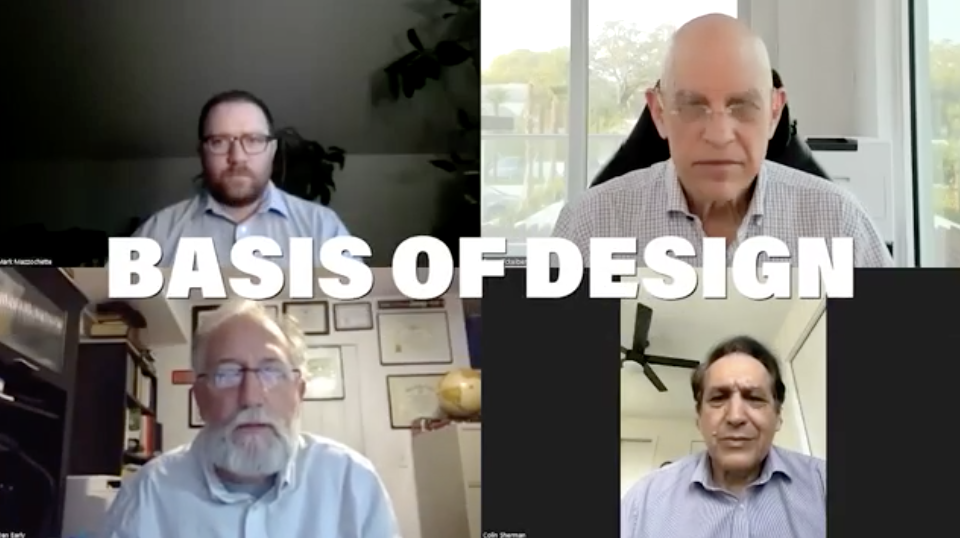
Riggs: When we get basis of design, it means it's very hard for others to then poach the deal because it's specified on that particular design.
Dan Early: Yeah. Yeah. And we just recently commissioned that equipment. It was just it was installed about a month ago and Mark Mazochette led the the field commissioning. So that's the backstory of how we got involved with this particular customer, why they had a need for the system and what we've done to help them get through this process with the Department of Environmental Protection.
Riggs: Is this a common problem that mobile home parks have these days with environmental departments?
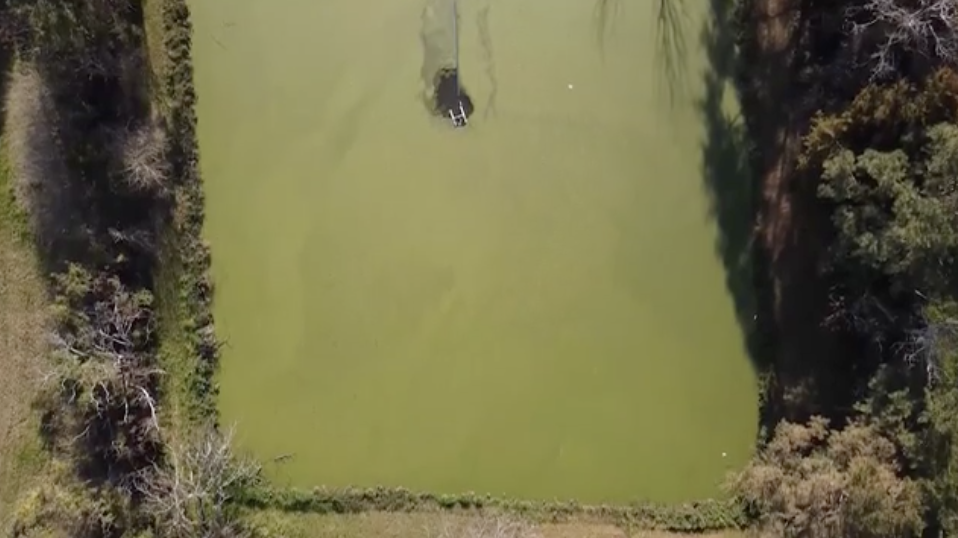
Dan Early: It is. And this is very commonplace around the United States. You'll see a lot of these customers and entities that don't have access to public sewer, they are beyond the reaches of the public utility grid. They have their own, they either have their own wastewater system or they need to build their own decentralized wastewater system. Some of those that do have existing systems a lot of times, which is the case here with this mobile home park customer, they've been out of compliance with their permit now for sometimes as much as a decade. So it is a very common problem. Anywhere you go.
Riggs: There's a big market. Well, of course, that is you know, it's astonishing how much noncompliance there is out there. And it's a good thing to hear that the Department of Environmental Quality, they have different names by state by state, are actually starting to enforce this. And it's creating a huge market opportunity for us, as I understand it. Yes. Now, what is a membrane bioreactor?
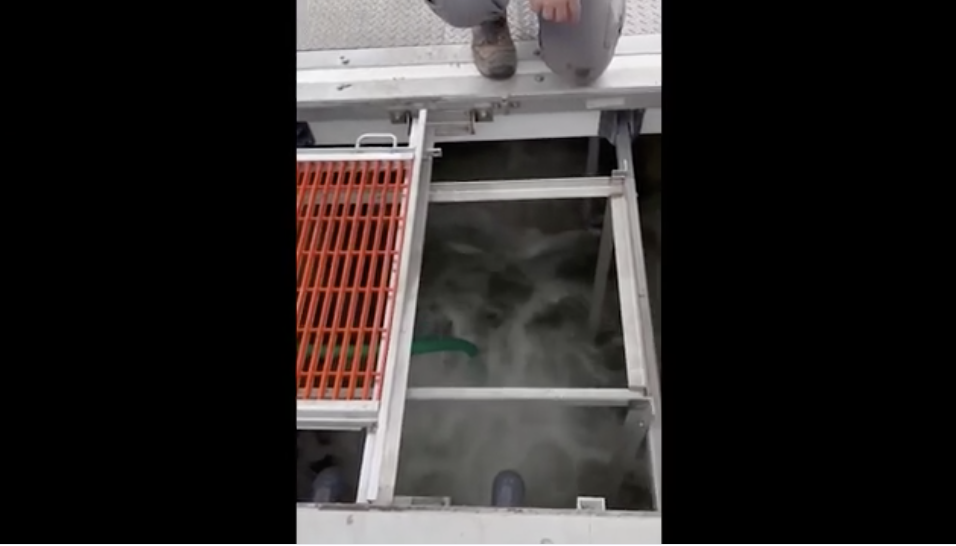
Dan Early: A membrane bioreactor (MBR) is, it's a machine that is designed to leverage the biological treatment processes that we commonly use in the wastewater treatment industry. So the biological process is used, the beneficial bacteria that occur naturally in the environment, they receive all of the incoming raw wastewater from the facilities and the bacteria, the beneficial bacteria, they will digest, they'll, they will consume and metabolize the organic load and the pollution and the pollutant load.
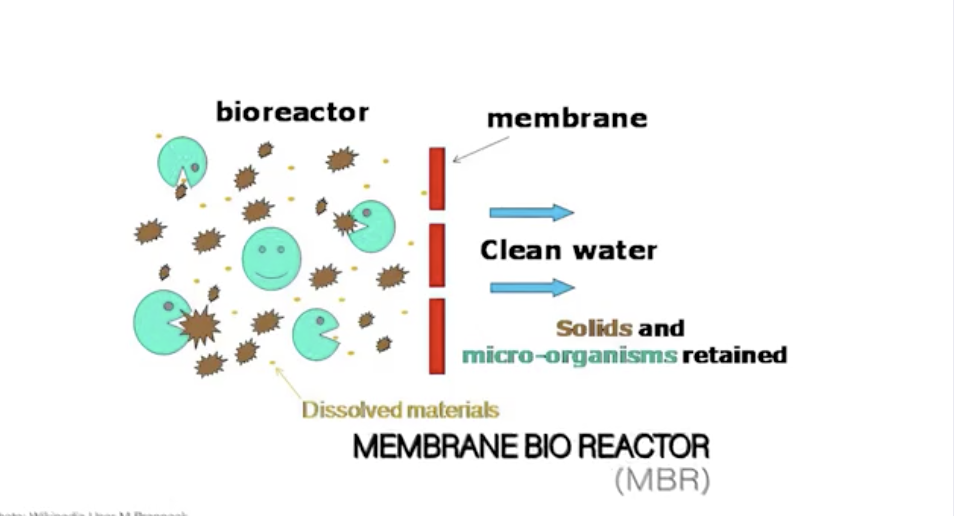
The membrane portion of the bioreactor is a really nifty piece of technology that allows us to filter the water out of the biomass and it really allows us to achieve a much higher treatment capacity. The effluent, the treated water that we produce from our systems is of the utmost highest quality. It has the appearance of almost being drinking water quality. That's how advanced it is. It's a much more compact system. It allows us to reduce this process and reduce the footprint and the energy consumption that goes with it. So it's a biological reactor. It's a biological treatment system with this filtration capability.
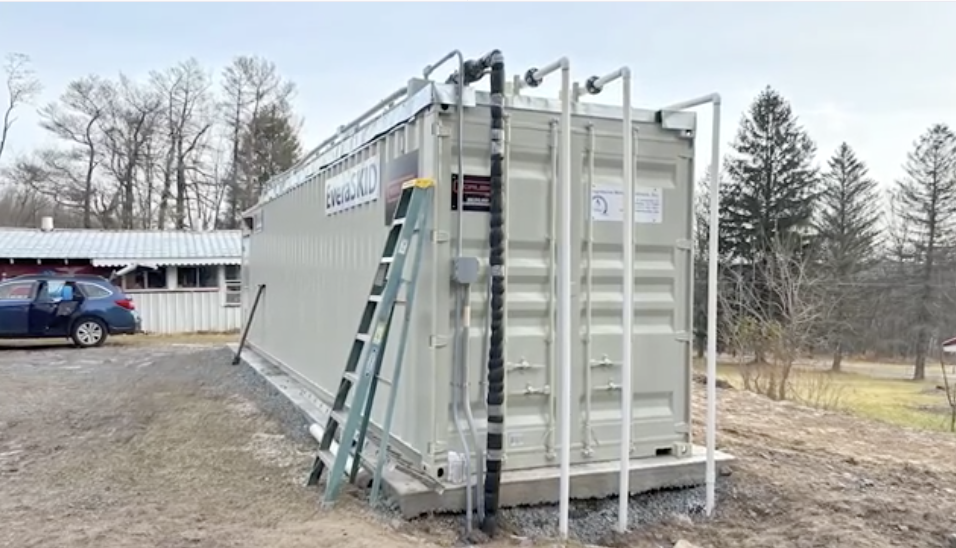
Riggs: And the EveraSKID is basically a line of standardized boxes, essentially, right Like standardized form factors, different sizes.
Dan Early: They are, they are Riggs the EveraSKID system and it's plug and play delivery model. We have five standard treatment capacities. We have a 5000 gallon per day treatment system, a 10,000, a 15,000, 20,000 and a 25,000 gallon per day treatment model. It's almost like going down to the Ford dealership. If you want to buy a Ford F 150 pickup truck or a 250 or 350 or 450, it's the same thing. They just get bigger and have more capability.
Riggs: Am I right? This is pretty advanced for the water industry.
Dan Early: Very advanced, I think Mark and Colin when they speak here shortly, they will testify to the perception that the local consulting engineer and the end user at this mobile home park, they were blown away by the the advanced compact process that we delivered with the EveraSKID system.
Riggs: Wow. Well, can't wait to hear more. Thank you, Dan. It's a project we've watched for months as it grew and came to fruition and it's always fun to actually be able to check them off, am I right?
Dan Early: Yep. It's been enjoyable. I'm very, very pleased and thrilled with the delivery we've had, with not only this one but a sister system. And we have another a third one we're getting ready to ship out in the next few weeks. So very pleased with the progress we've made over the last six months.
Riggs: Very exciting. Well, Mark Mazochette, you of course, took over the actual execution of this. Tell me how you got the project and what you did and feel free to illustrate as you wish.
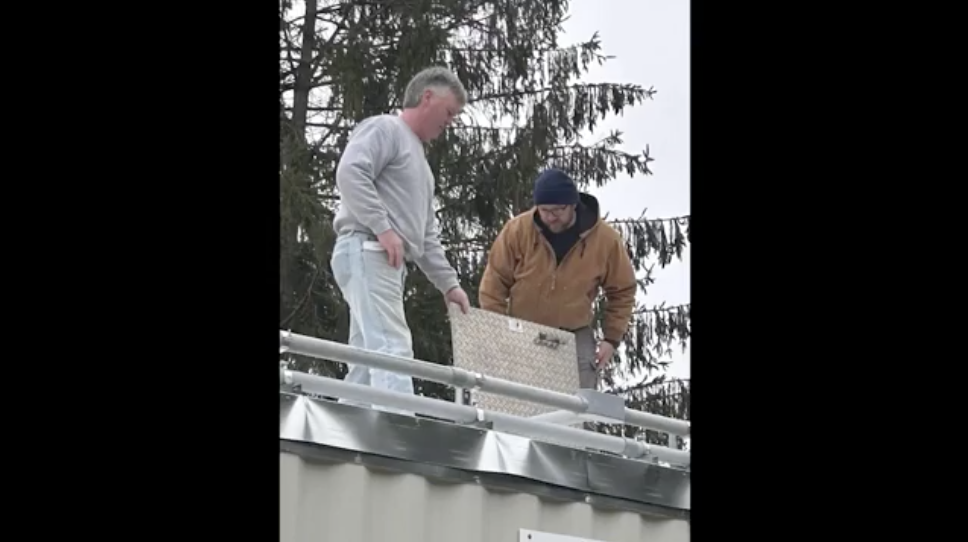
Mark: Project was handed to me to to basically turn from our conceptual layouts and what we worked on with the engineer to turn it into an actual thing you can walk into and walk onto and pump water through.
So it started with our fabrication team and turning the design into real life there, working with the different players, making it happen in our factory. We were able to put it together there, test it with clean water prior to shipping it out.
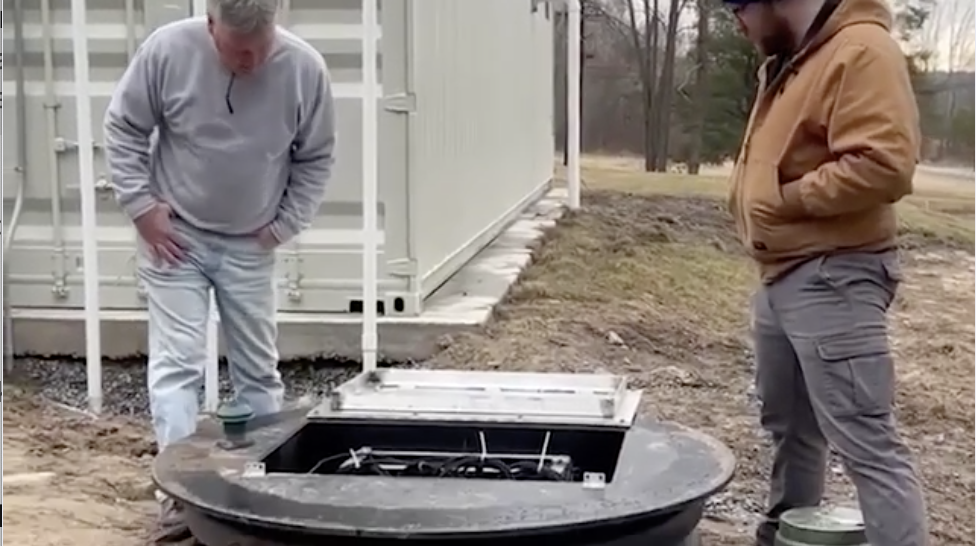
Once it got on site, one of the main features of this unit is how streamlined the installation is. All the contractor needs to do is pour a concrete pad, get some plumbing to and from it, and then drop the unit on the pad, finish those plumbing connections, get power to it, and it's ready to receive water. That is another thing that is kind of unique and unheard of almost in this industry, especially in the small flows. We're dealing with 10,000 gallons per day. An individual system that's relatively small. The deployment is never that quick and never that that easy. I kept thinking throughout this experience that, you know, a contractor who's got his ducks in a row could probably do this whole thing start to finish in about a week.
Riggs: Obviously, you have a lot of engineering experience. How is this different or an upgrade from your previous work experience?
Mark: It's an upgrade in the fact that we are able to really leverage our engineering experience and knowhow from the get go and apply these technologies to these these kinds of flows. You know, the MBR is technology you see elsewhere in the large municipal plants, but we're able to innovate given the tools we have and the technology, how the technology has scaled down to make it happen at these flow rates we're talking about. That's been a major difference.
Riggs: Yes. And now Dan mentioned something called basis of design. Is that relatively unique in the industry as far as you've seen?
Mark: When you get to a point where the engineer, the client, everybody likes your device that much that they want to specify you as that sole source, it means that they don't really see any value in looking anywhere else and they're that sold on your piece of equipment. So it's not that common you get that kind of designation.
Riggs: I'm getting the image of a consulting engineer getting on his knees in front of Dan Early and will you marry me?
Mark: You know, it's not too different a relationship because we want our unit, another unique thing about our unit is that we go to great lengths to specify and include equipment and components that will last for decades, not lose value to corrosion, not require a ton of maintenance over the years, and so you are entering into somewhat of a marriage for decades and the foreseeable life of anybody on this call here.
Riggs: Well, that's excellent, Mark. So then you obviously this week you went ahead and commissioned it.
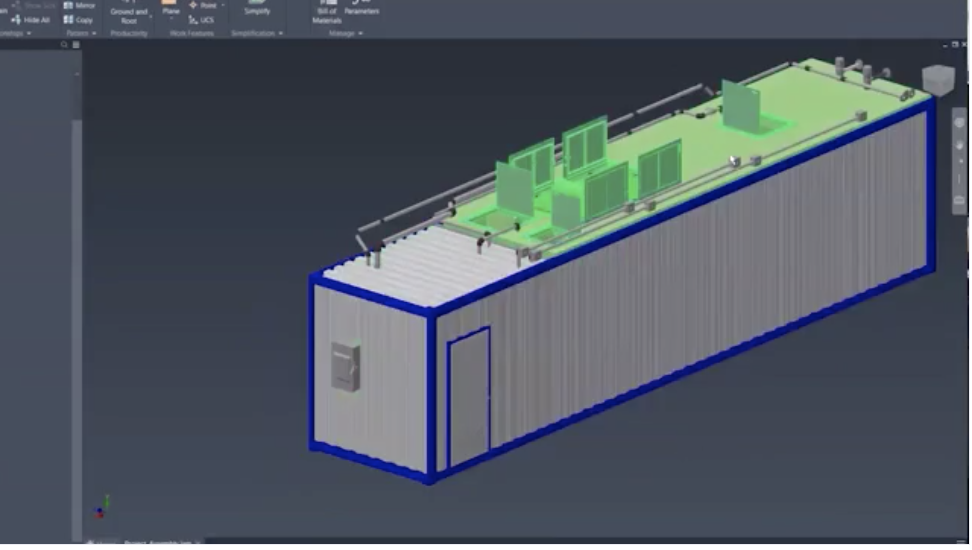
Mark: So here's the model that we used. It is a plastic tank that was dropped into a big hole, cut into a 40 foot shipping container.
Riggs: Ah!
Mark: Yes and the shipping container is a standard size. It's, we use that because it's very easy to send that down the road on a truck shipping from our fabricators to wherever. And at the one end of this unit you can see there's a door, an entry into a space that is set aside for some equipment for processing, helping to process the water that we pump through this.
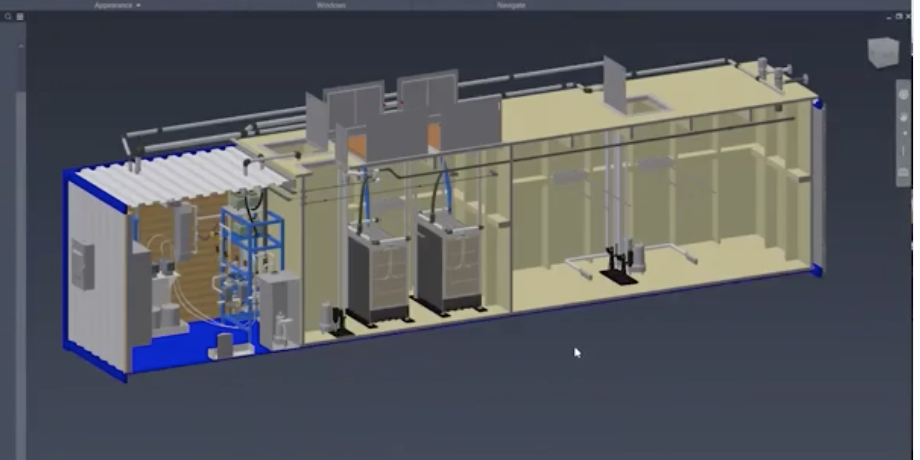
And when do you use water Riggs? Right. You use water kind of in the morning when you wake up and then you leave for the day. You come back, you use more water. So there are peaks throughout the day and this flow equalization tank will fill up during those high flow times and then drain out during the low flow. We have pumps in here at this end that transfer water into the next stage at a constant rate. So it equalizes the flow, makes it so that the water flow going to our membrane bioreactor, which is this next chamber, is a constant five, ten gallons a minute, which the bioreactor likes.
Riggs: Kind of like a water tower.
Mark: Pretty much, Yep. We have two filtration cartridges located in this chamber here. There's aeration at the bottom of them which provides oxygen to the bacteria. Just like us, they need oxygen to breathe and to do their digestion work. The bacteria are going to be floating around in suspension and the filters will, as that movement is happening from the aeration, the suction pulled on those to pull clean water through and leave the bacteria in this chamber.
Riggs: What happens to the debris or sludge?
Mark: It'll build up over time. It'll concentrate. It's a slow concentration at this size. The operator will monitor that sludge for concentration and other parameters. And he'll tell based on what we, our advice as well, when to waste and when to remove that sludge and put it elsewhere. It's healthy as well for the sludge to have dead decaying bacteria removed every once in a while.
Riggs: And then far left, as you say, various controls and accessories.
Mark: That's correct. I mentioned aeration systems. I mentioned pumping systems. I mentioned monitoring systems. Most of those are housed in this room here. And it's also a comfortable place for an operator to come and and do his work to keep an eye on the system.
Riggs: That's where you might have controls. For example, remote controls could be there, right?
Mark: That's correct. Our standard is to have an Ethernet connection to these units or there's an option for a cellular or a Wi-Fi connection so that we can be remotely monitoring the units, making changes to the parameters, helping diagnose issues while the operators there as well. This unit we are, we're actively monitoring through our remote system.
Riggs: Now that brings us to the ability to fully operate and maintain a system such as what Colin has got going here, where he is putting together contracts where we or another water company that we designate is responsible for making sure that the unit continues to operate. So in that case, you'd be able to see right there from the data looks like a filter needs changing or whatever, and you'd be able to deploy either a local water guy or whatever to do the work.
Mark: These systems can't ever be run without some kind of human interaction, occasionally. I will say, they're very low maintenance, when they're nothing wrong. For example, once or twice a month is what our visits are mandated as. But there's very much that can be done remotely from changing settings to diagnosing an issue. There's a remote alarming capability as well to help identify those times when somebody has to be sent out.
At the end of the day, the operator is kind of your end user, right? He's the person that we want to make this user friendly for, because a better, a system that's more easily operated is one is going to be a successful system. So we have a lot of operator friendly features worked into the design here and we think our operators are pretty happy with what they see.
Riggs: So thank you, Mark. That's really fascinating. Let's get Colin to tell us a little bit about his experience.
Colin: Right. So I'm new to the company and I heard a lot about the MBR unit and when I heard that Mark was going to do a commissioning, I jumped to it and said, "I'd like to come and have a look at this." I was very, very pleasantly surprised. The professionalism in commissioning these units was unbelievable. When I arrived there with Mark, the tank had arrived with the biomass, which they loaded into the unit.
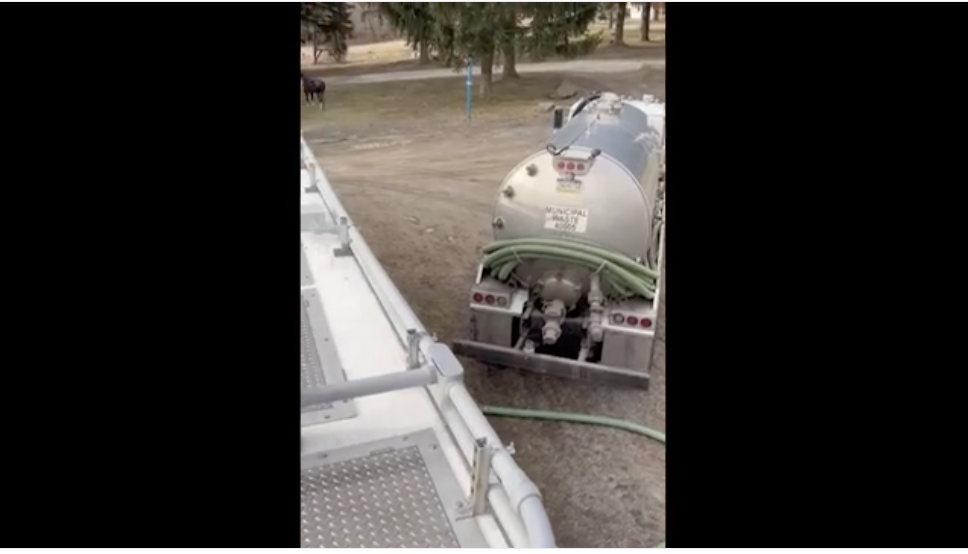
Mark: This morning we are receiving a delivery of seed sludge for our 10K MBR unit. The truck pulled up here and is kind of prepping for that, depositing that sludge inside the plant.
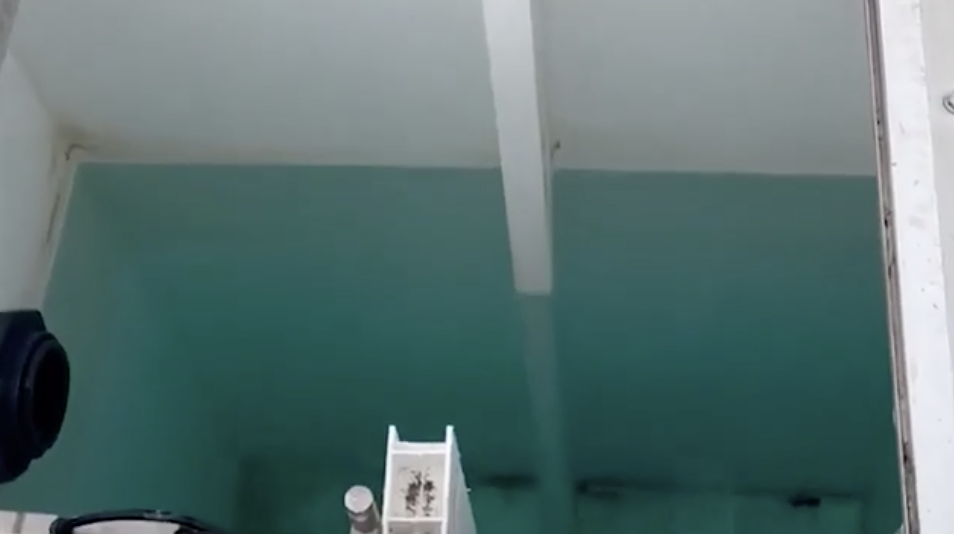
Colin: And within no time we were producing clean water. The engineer that was there, as well as the service provider, were absolutely amazed. They had never seen this before. They were very impressed with the compact design of the unit. And they and they were very, very surprised that clean water was being produced within hours.
Riggs: Wow.
Colin: I was, I was very, very impressed with it. And it all bodes well for Water On Demand because we know that these units are going to be well made. They're going to be professionally commissioned and handed over to the service provider that we appoint. And we know that they are robust and will last for the life of the contracts.
Riggs: That's fantastic. Well, thank you, Colin, for making the trip and for taking the pictures and videos.
Dan Early: So if you could Mark, I'd like for you just to scroll through just a handful of photos, select photos, and just the outside of the container is great. I'd like to get some photos of the inside, some of the compartments and just a few shots of the the equipment room.
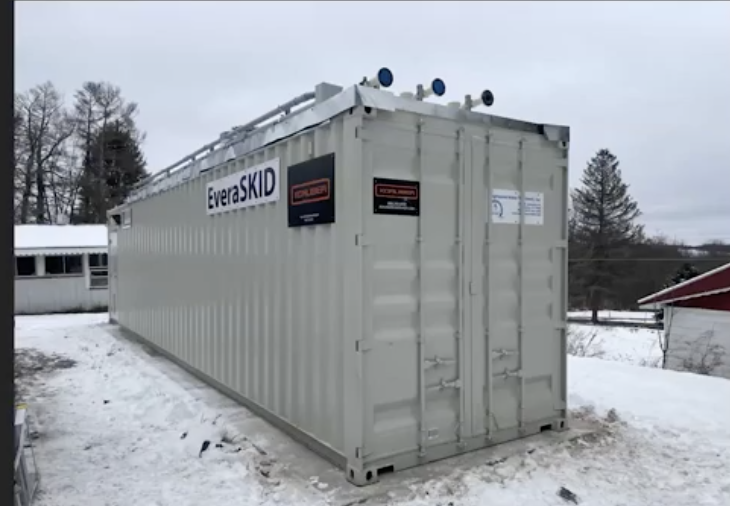
Mark: Here's the unit as described before with the shipped container. On top is the tank insert, that plastic tank insert, with some of the utility connections.
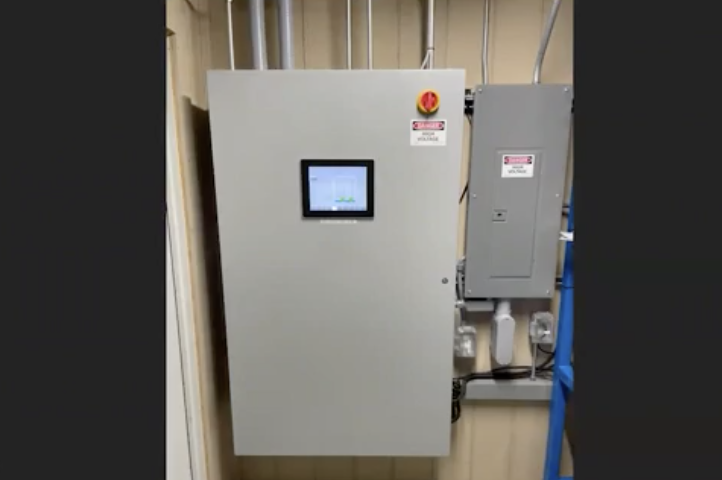
And inside the building I'll start here, with our control panel. This is the brains of the unit. It's got an HMI touch screen for operator interface.
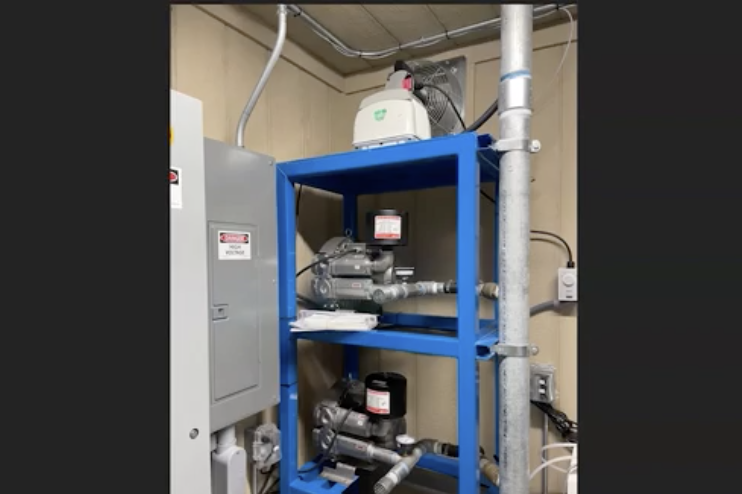
We have several supportive systems, like I mentioned, the aeration system.
Riggs: An HMI interface is a human...
Mark: Human Machine Interface.
Riggs: Thank you. Appreciate it.
Mark: The Power supply is a simple single phase 230 volt, which is available pretty much everywhere in America. We can customize that voltage, of course.
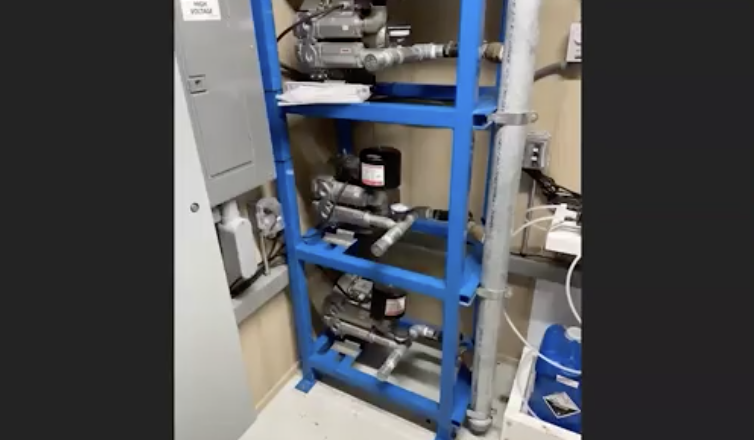
Supporting systems include also a chemical feed system, which you see to the right here in that picture.
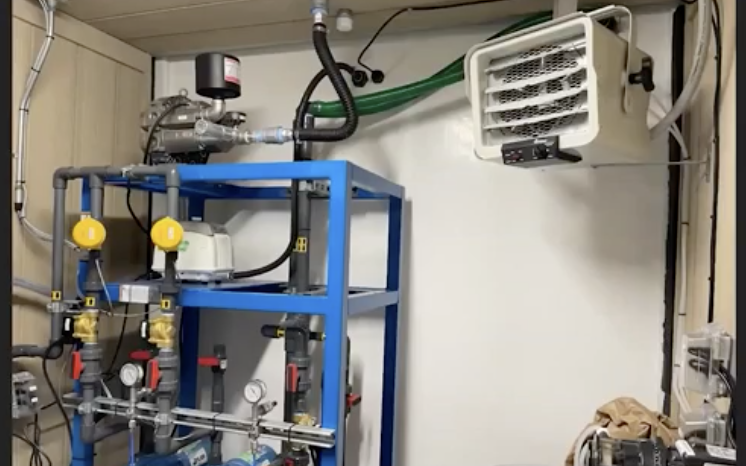
Here's a permeate pump skid which actually pulls the clean water through the membranes and pushes it into the effluent treatment process.
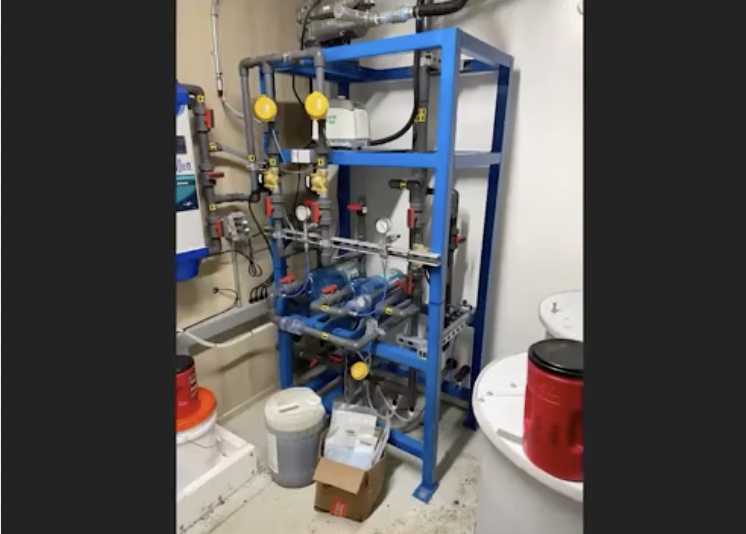
On the left there is a UV disinfection unit which we use to meet our permit limits for bacteria.
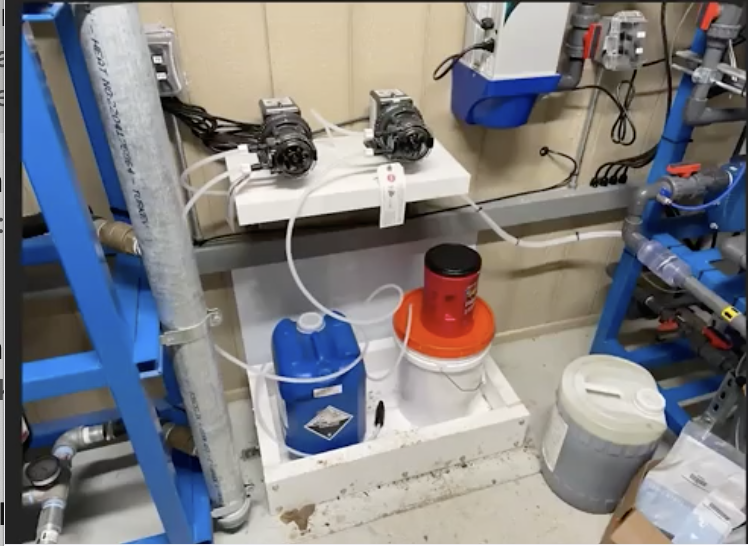
Chemical feed for actually cleaning the membranes in place. So an automated system for cleaning the membranes with the chemical treatment which basically refreshes them like new every time. We do that once a week.
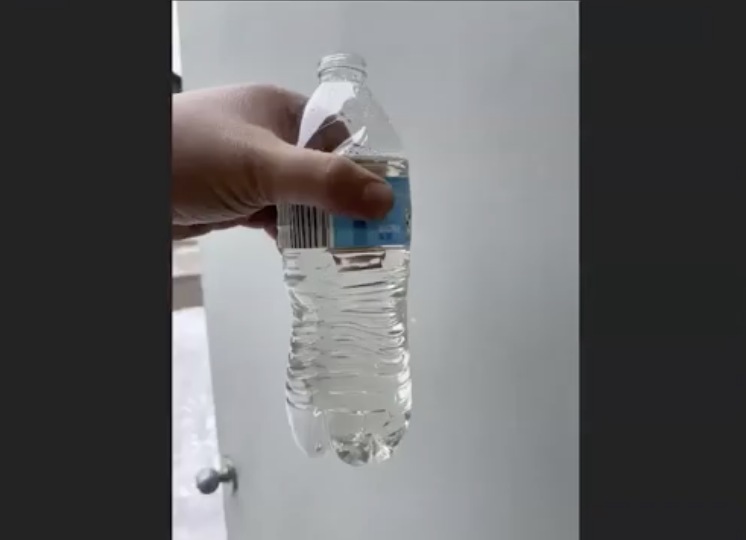
Here's an example of what Colin was talking about. This is the effluent after a few hours of of the system working,
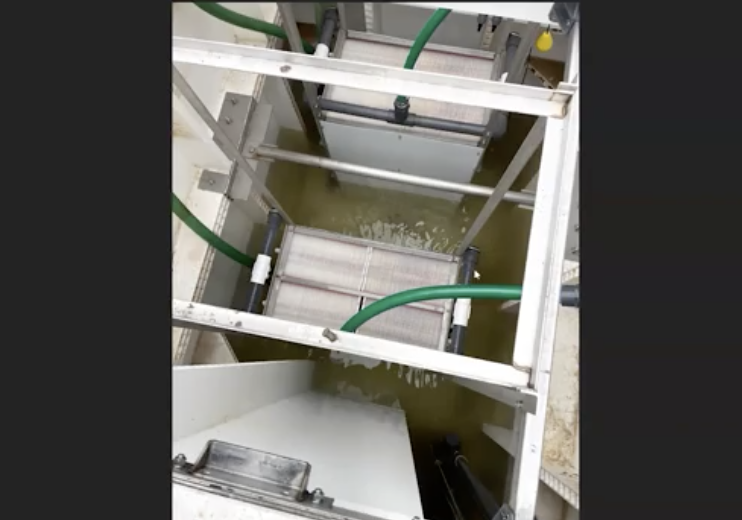
I'll get you a good picture of the membrane modules themselves. This is a pretty good one looking down into that membrane bioreactor tank. A few things to note. We have plastic structure reinforced tankage. That's a standalone tank with some stainless steel reinforcement.
The modules here have both air and water plumbed to them for their operation. It's very serviceable. This unit, just by unscrewing a few bolts, can be removed and taken out, set on the ground and the modules replaced if necessary. Very easy to replace compared to other options.
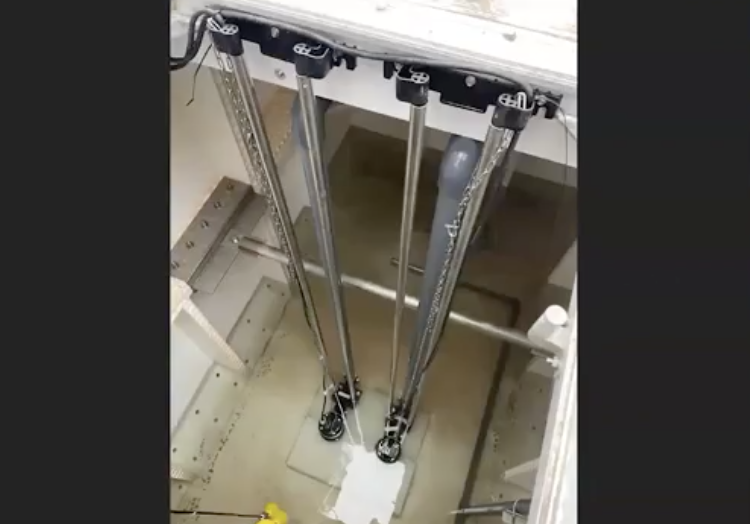
Pumping systems look like this. Pretty simple stuff, but very robust. All of our pumps are are stainless steel pumps, plastic piping. Everything's corrosion resistant and ready to operate for decades.
Dan Early: Got any photos of the topside of it?
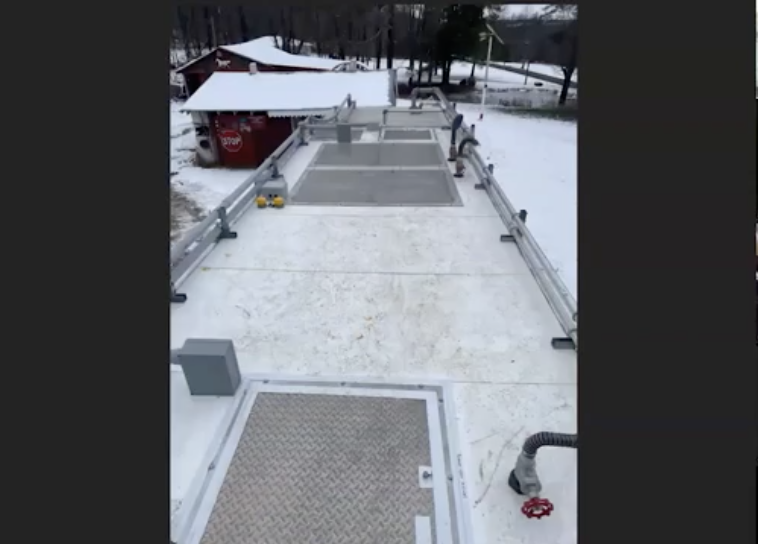
Mark: It'll involve aluminum hatches your service piping. Like I mentioned, we use aluminum aeration piping. We have plastic PVC conduit for electrical, both low voltage and high voltage. This is the top of the tank. Is that structurally reinforced plastic material. The hatches are set right into it. Everything is rated for walking very comfortably and exposure to the elements for decades. This is a UV resistant stuff. And you can see the other end over here with our equipment room roof is still that corrugated metal container roof. So it went down the road like this came out of our factory just like this and was set right on the ground.
Riggs: Gentlemen, I'm really blown away by how clean and beautiful this is. It's really helpful to actually be able to get a grasp of what you guys build because all I see is numbers and it really helps to see the actual thing. So I'd like to congratulate you. So with that, I'm going to sign off. I really appreciate the guys, the work you guys do at Modular Water Systems, supported by Progressive Water Treatment in McKinney, Texas. And let's keep on trucking. I'm so happy. Thank you. And let's have a great rest of year.
Colin: You too.
Mark: Thanks. You too.
End of presentation
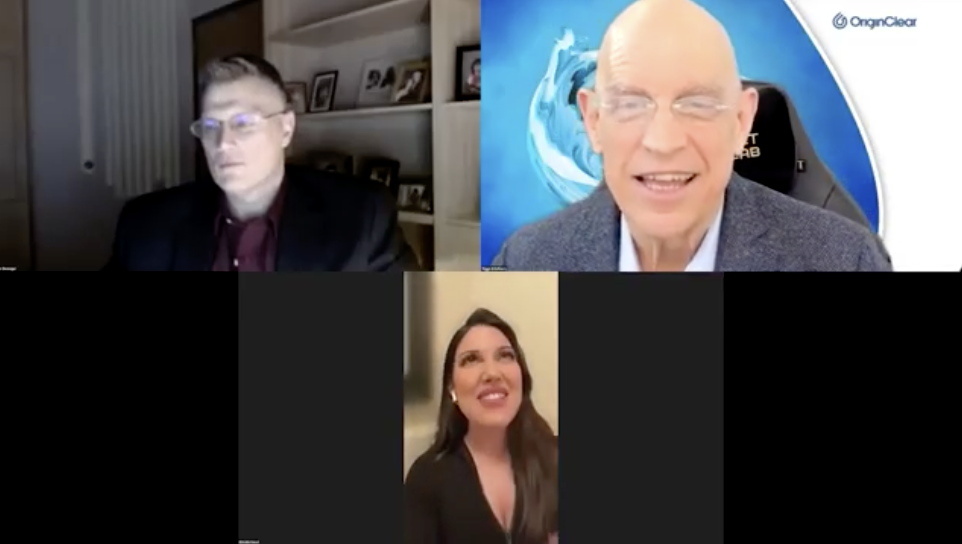
Freewheeling Discussion
Riggs: That was cool, huh? I know it was geeky engineering stuff, but you know what? We are a water company and so we're going to show you stuff. As Keith Roeten says, "As a retired electrician, I'm impressed with compactness and functionality." So that's a very, very cool. Colletta Sharp, "Great idea for small communities." Absolutely. So and then Keith also says, "You all are learning how to positively tweak everything on the fly. Presentation, exposure, participation and urgency." Awesome. This Modular Water Systems is a gem. And you're going to hear be hearing a lot more about this as we go forward.
Guess what? It's time for the free wheeling discussion. Estrella, are you able to join us?
Ken: You don't have the power yet. He does that to me all the time. Don't worry about it.
Estrella: Give me the power.
Ken: Give her the power, will you?
Riggs: All right, Great. Are you having a good time in Deer Valley?
Estrella: I am having the best time. I wish you guys were there.
Riggs: Well you're looking like you enjoyed the day, so that's excellent. So what do you think about this geeky engineering stuff, huh? That was fun.
Estrella: I love it. And I love the announcement as well that was launched today. I think it's, uh. It's an amazing.
Ken: We thought you'd like that.
Estrella: Oh, absolutely. Like, we are creating a movement and we're allowing people to be a part of it and be a part of the change. And also, it's awesome to be able to include everyone. You know, in the beginning stages.
Riggs: I mean, you know, I hate the elitist way of raising money. I mean, yes, we're better than Wall Street, which is, you know, they deal with the trillions that they get from the government. But, you know, for a long time, we were bringing in, you know, accredited investors. And we still are. It's active and there's lots of exciting things happening with that.
Ken: But ask your average unaccredited or non accredited investor. When's the last time they were able to invest before Wall Street?
Estrella: Right.
Ken: Before institutional money. You know, usually these things are cultivated inside of a venture capital firm for a decade. Right? They kind of just percolate and and all the friends and family pile in and they make all this money and they blow up the valuation. Then they go public and then, you know, kind of Mr. Ameritrade finally gets into the thing and it's down 20% at the open, you know.
And, you know, they kind of, you know, they kind of come along last and they get kind of beat up in the process. That was something that would happen with Airbnb. I think it was valued at like, you know, $140. It was going to open and next the next day it was $120 or something like that. So hopefully, um, reversing the process for the average investor really gives them the advantage finally.
Estrella: Absolutely. I mean, I feel like if I had the ability, let's say, for Apple to get in in the early stages, it would forever change my life.
Ken: Yeah. There were secretaries that were paid in stock and were multi-millionaires.
Riggs: The day Microsoft went public, they made 4800 millionaires that one day.
Ken: Right.
Estrella: Wow.
Ken: Very cool.
About the Regulation A Offering
Riggs: Um, Bob wants to know, can you elaborate on the no dividends for WOD (Water On Demand)? Well, here's the thing. The crowdfunding is straight common. Our broker dealer said, "No. We just, common stock. You're going to have stock in the company." And you know the way, the design of regulation A and we're not touting this but the design of it is that it's designed so that the stock can eventually trade on a public exchange. We decided that dividends are available to the accredited investors in the Series Y, which I think Bob, you invested in, and that's going to go all the way to the $20 million. Right now we're at like 7 or 8 million so far. And after that it's over.
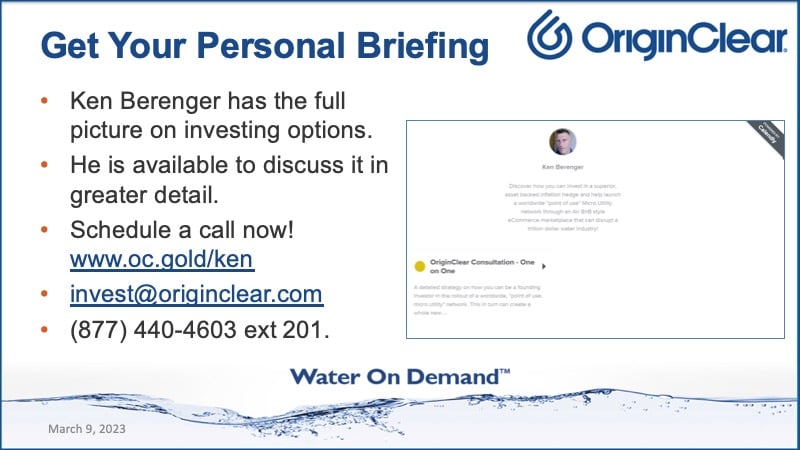
Because after that we expect to be able to raise money from the crowdfunding and from Wall Street. So the opportunity to get residuals, dividends is not quite the right word. You know, royalties, residuals, percentage of profits is in what we call the series Y, which is the Water On Demand offering that OriginClear is hosting for accredited investors. Those of you who are existing investors who have not spoken to Ken in the last two weeks really need to talk to Ken because lots going on that we really can't get into. Ken can't even say, "Oh yeah."
Ken: We're not even. We're not going to try to be cryptic. We're just not going to say anything.
Riggs: So, well, we don't want to keep you too long from, you know, because you have apres-ski, Estrella, you know.
Estrella: Right. But I'm so happy to be here.
Riggs: It's so good to have you. So...
Estrella: Thank you.
Riggs: You're obviously right in the forefront in terms of promoting this. Now, let's talk about World Water Day and we're going to cover it again in seven days in the 16th. But we are going to present on the 22nd New York location called NeueHouse and basically cocktails. And three of us will be speaking. So be in New York, in the city. And then the next morning we will be at the New York Stock Exchange the morning of the 23rd.
And guess and yes, in fact, all of us will be there, too. It should be a lot of fun. So it's going to be a great celebration and it's going to be what we do every single year on World Water Day is make a big event and these big events will become bigger and bigger and bigger. And like my friend Grant Cardone, they will turn into giant amphitheater events for World Water Day.
Estrella: I love it.
Ken: I have no doubt that they will be those events. I don't know that we'll be holding them in person that way. I believe that we'll have to do some sort of video type presentation because I think the audience by next year, given, given what we're working towards, Riggs.
Riggs: Will be in the millions, I know.
Ken: Now, I can't say anything, can't say any more than that. Um, so I actually am enjoying some of this cryptic stuff, right. Um, but given what we're working towards, I really think that we could next year be looking at kind of a video type presence only because the audience could be global.
Riggs: OK hybrid. In other words, presentation to people. I like presenting to people and then it's covered, maybe even live streamed. That's really the way to do it.
Ken: Right. And I'll have a I'll have a professional lighting person next time, I promise.
Riggs: No, no, no. This is good. This is, this is Addams Family revisited.
Ken: This is the interrogation room. This is where I got the guy tied to the chair, you know.
Riggs: But I do want to say this much. If you're an existing OriginClear accredited investor, Ken has super important information for you that will be beneficial to you. And I'm not going to say anything more on this channel. So with that, I'm going to thank both of you for being here. Estrella, go back to having fun with your friends and, you know, drinking the spicy wine and whatever you do. And I know the snow is fantastic. So enjoy.
Estrella: Thank you so much. But I'm so happy I was able to pop in and I can't wait for next Thursday.
Riggs: Fantastic. Let's make it happen.
Estrella: Awesome.
Riggs: Thank you, Ken.
Estrella: Awesome.
Riggs: Thank you, Estrella.
Ken: Good night folks.
Estrella: Thank you so much.
Riggs: Thanks for showing up. We had a great audience. James Wright, "Good night." Edward Vigil says, "Thank you." And we're out of here. Good night.
Estrella: Awesome. Good night.
%20250px.png?width=250&height=53&name=OriginClear%20Logo%202019%20(RGB)%20250px.png)



